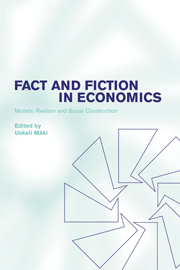Book contents
- Frontmatter
- Contents
- Notes on the contributors
- Preface
- I Introduction
- II Setting the scene
- III Economic models and economic reality
- IV The constitution of economic reality
- V The institutions of economics
- 16 You shouldn't want a realism if you have a rhetoric
- 17 The more things change, the more they stay the same: social realism in contemporary science studies
- 18 Economists: truth-seekers or rent-seekers?
- Index
- References
16 - You shouldn't want a realism if you have a rhetoric
Published online by Cambridge University Press: 22 September 2009
- Frontmatter
- Contents
- Notes on the contributors
- Preface
- I Introduction
- II Setting the scene
- III Economic models and economic reality
- IV The constitution of economic reality
- V The institutions of economics
- 16 You shouldn't want a realism if you have a rhetoric
- 17 The more things change, the more they stay the same: social realism in contemporary science studies
- 18 Economists: truth-seekers or rent-seekers?
- Index
- References
Summary
Uskali Mäki and I taught a course at Erasmus in the Autumn of 1996 called “The words of science.” It had a dozen or so bright undergraduates, many with philosophical backgrounds, some with economics. We started with classical rhetoric, as represented for example in Michael Billig's work on social psychology (Arguing and Thinking 1987), moved on to the modern rediscovery of rhetorical ideas in Austin and Searle and the like, then to the (mainly British) sociologists of science who call themselves The Sons of Thomas Kuhn. We ended with the daughters, such as Helen Longino. Rhetoricians all were these students of science, though only a few of them notice their connection to the Greek sophists and to the rhetorical tradition that ruled education in the West until the seventeenth century.
It was a wonderful experience to be trapped in a room with Uskali Mäki for several hours a week, forced to explain yourself! Uskali Mäki and I have disagreed on Realism, but it is a tribute to his attitude – which I shall argue is not Realist–that he was willing to converse. And converse. And converse. He has always been willing to converse, an open-mindedness I do not find universal among people trained in analytic philosophy. Clark Glymour amused many of his colleagues by beginning his Theory and Evidence (1980) with the following jeu d'esprit, an example of openness to ideas in analytic circles: “If it is true that there are but two kinds of people in the world – the logical positivists and the god-damned English professors – then I suppose I am a logical positivist” (Glymour 1980, ix).
- Type
- Chapter
- Information
- Fact and Fiction in EconomicsModels, Realism and Social Construction, pp. 329 - 340Publisher: Cambridge University PressPrint publication year: 2002
References
- 2
- Cited by



